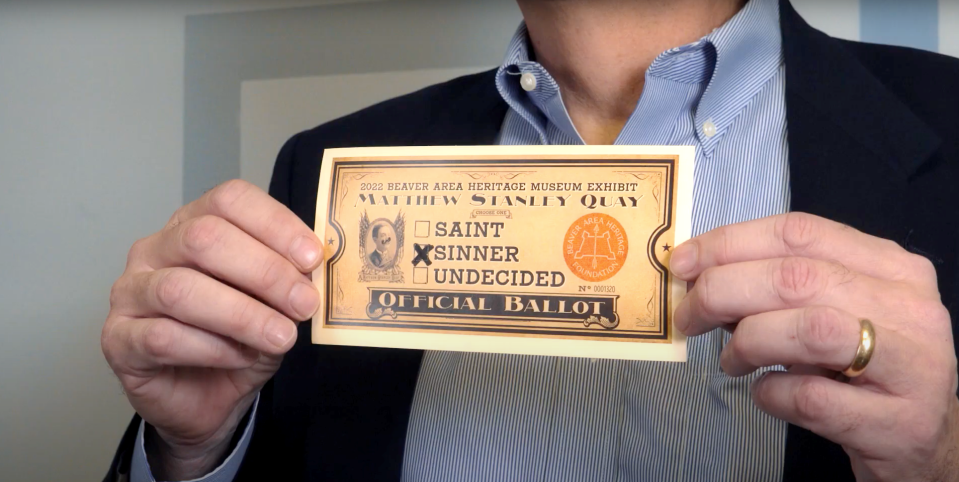'Sinner' not 'saint;' voters make choice on Beaver senator's legacy
- Oops!Something went wrong.Please try again later.
BEAVER - The votes were tallied, and no recounts have been demanded.
Looks like visitors to the Beaver Area Heritage Museum have decided 19th century U.S. Sen. Matthew Stanley Quay, of Beaver, was more "sinner" than "saint."
Such were the results of a done-for-fun election this year, where officials at the Beaver museum asked the public to weigh in on the legacy of Quay, a driving force in the Republican Party who represented Pennsylvania in the U.S. Senate from 1887-99 and again from 1901 until his death in 1904.
"It was a landslide vote," museum spokesman Mark Miner said.

Of the 1,500-plus museum visitors this past season, 427 votes on Quay's status were cast as follows:
217 votes – 50.8 percent - Sinner
127 votes – 29.8 percent - Saint
73 votes – 17.1 percent - Undecided
10 votes – 2.3 percent - Invalidly marked ballots, "but no hanging chads," Miner said, making a reference familiar to all who remember the George Bush-Al Gore presidential election in 2000.
For the Beaver Area Heritage Museum's Quay voting, local independent, certified public accountant Tod Arbutina did the counting.

More:Documentary on Beaver politician, Quay, to premiere
The museum's year-long free exhibit, “Matthew Stanley Quay: Saint or Sinner? You Decide!”, featured artifacts educating museum-goers on aspects of Quay’s complex life and legacy.
Displayed items included more than a dozen political cartoons from some of the country’s leading contemporary newspapers and magazines, images of Quay and his friends and landmark sites, and one-of-a-kind documents on loan from James A. Kehl, author of the biography "Boss Rule in the Gilded Age: Matt Quay of Pennsylvania."
The exhibit included a video interview recorded early this year with Kehl, who died this past August. The interview goes deeply into the elements of one of Beaver's most famous residents, examining the personality and sources of power of Quay, who served as chairman of the Republican National Committee.
Quay's influence was credited with helping a one-term senator from Indiana, Benjamin Harrison, get elected in 1888 as the 23rd U.S. president. The senate.gov history page said, "Described as the 'ablest politician this country has ever produced,' Quay was a shrewd operator who enjoyed the game of politics and, as one biographer noted, 'possessed a keen eye for detecting the enemy's weak points.'"
"What made Quay such a polarizing figure was his complex roles over the years as Civil War hero, Beaver Argus newspaper publisher, Beaver County prothonotary, Philadelphia Recorder, Pennsylvania state treasurer, U.S. Senator and chairman of the Republican National Committee, a museum press release said. "The exhibit touched not only on Quay’s personality, sources of power and money, but also his talent for organization and cultivation of a strong voter base. Evidence was shown how Quay supported minority groups, worked to help elect Presidents Benjamin Harrison and Theodore Roosevelt, and developed a mutual admiration with famed English author Rudyard Kipling."
This article originally appeared on Beaver County Times: Beaver museum voters say Sen. Quay, R-PA, was sinner, not saint

